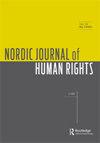Killing in the Name of Islam? Assessing the Tunisian Approach to Criminalising Takfir and Incitement to Religious Hatred against International and Regional Human Rights Instruments
IF 1.2
Q3 POLITICAL SCIENCE
引用次数: 1
Abstract
ABSTRACT The rise of political Islam since the 1970s and the lack of a robust political alternative during the Arab Spring have paved the way for the widespread issuance of accusations of unbelief or takfir against individuals, groups of people, or institutions. These pronouncements fit into the broader context of radical Islamist ideologies spread by systematic hate propaganda, and when the two converge they constitute instigation to murder. The need to address this phenomenon has arisen in states with substantive Muslim populations in order to protect essential human rights. Tunisia has chosen a head-on approach by criminalising accusations of unbelief and incitement to religious hatred and loathing as terrorist offences. While this approach can be seen as an encroachment upon the right to freedom of expression, it has to be balanced against states' positive obligations in protecting competing human rights. Drawing on the jurisprudence of the Human Rights Committee of the ICCPR and the African Commission of the ACHPR as well as literature in the field of human rights, this paper demonstrates the interrelation between the right to life, freedom from fear, security of the person, and the right to dignity, as well as their violations through unfettered takfirism.以伊斯兰教的名义杀人?评估突尼斯对违反国际和区域人权文书的塔克菲尔和煽动宗教仇恨行为定罪的做法
自20世纪70年代以来,政治伊斯兰的兴起以及阿拉伯之春期间缺乏强有力的政治选择,为广泛发布针对个人、人群或机构的不信仰或塔克菲尔的指控铺平了道路。这些言论符合激进伊斯兰主义意识形态的大背景,这种意识形态是通过系统性的仇恨宣传来传播的,当两者融合在一起时,就构成了煽动谋杀。在有大量穆斯林人口的国家,有必要解决这一现象,以保护基本人权。突尼斯选择了一种正面的方法,将对不信仰和煽动宗教仇恨和厌恶的指控定为恐怖主义罪行。虽然这种做法可以被视为对言论自由权的侵犯,但它必须与国家在保护相互竞争的人权方面的积极义务相平衡。根据《公民权利和政治权利国际公约》人权委员会和《非洲人权公约》非洲委员会的判例,以及人权领域的文献,本文论证了生命权、免于恐惧的自由权、人身安全和尊严权之间的相互关系,以及不受约束的塔克菲尔主义对这些权利的侵犯。
本文章由计算机程序翻译,如有差异,请以英文原文为准。
求助全文
约1分钟内获得全文
求助全文
来源期刊

Nordic Journal of Human Rights
POLITICAL SCIENCE-
CiteScore
1.00
自引率
25.00%
发文量
29
期刊介绍:
The Nordic Journal of Human Rights is the Nordic countries’ leading forum for analyses, debate and information about human rights. The Journal’s aim is to provide a cutting-edge forum for international academic critique and analysis in the field of human rights. The Journal takes a broad view of human rights, and wishes to publish high quality and cross-disciplinary analyses and comments on the past, current and future status of human rights for profound collective reflection. It was first issued in 1982 and is published by the Norwegian Centre for Human Rights at the University of Oslo in collaboration with Nordic research centres for human rights.
 求助内容:
求助内容: 应助结果提醒方式:
应助结果提醒方式:


